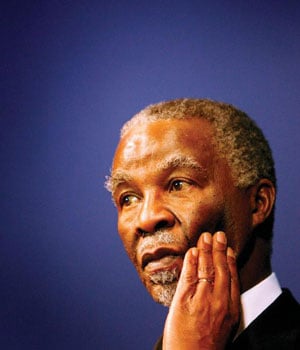
South Africans don’t like to hide issues of national importance under the carpet. Part of this important national attribute is our capacity to confront each other. We make each other feel extremely uncomfortable.
Public debates in South Africa are merciless. We need to pause and celebrate the freedom of speech we are enjoying.
But, we are also good at shooting ourselves in the proverbial foot. Which explains why on the extreme right of the ideological spectrum, there are people who suffer from apartheid nostalgia, are racist and display the apartheid flag. On the extreme left (or is it extreme right as well?), there are populist leaders who speak of cutting out people because they are white.
The resurgence of extremism – on the right and the left – signifies a regression from the ideals of nonracialism espoused in the Constitution. While the Constitution guarantees freedom of speech, freedom of thought, and so on, extremism risks deploying such rights to undermine the constitutional values of nonracialism.
A contributing factor to the politics of intolerance is the failure to fully appreciate our divisive history and seek a unifying future. Yet, the unifying future is within reach – if only we worked for it.
The starting point could be former president Thabo Mbeki’s controversial views on nation building. While he was deputy president, Mbeki made two speeches that could be useful in getting us out of the present conundrum that threatens to unnecessarily reignite racial tension.
The first was the "I am an African" speech delivered in celebration of the adoption of the Constitution in 1996. In it, he sought to redefine an African as a composite of various, often conflicting, historical strands that share a stake in Africa and its future.
Of the victims of colonialism, he said: "I owe my being to the Khoi and the San whose desolate souls haunt the great expanses of the beautiful Cape – they who fell victim to the most merciless genocide our native land has ever seen, they who were the first to lose their lives in the struggle to defend our freedom and [independence] and they who, as a people, perished in the result."
Of the Afrikaners, he said: "I am the grandchild who lays fresh flowers on the Boer graves at St Helena and the Bahamas, who sees in the mind's eye and suffers the suffering of a simple peasant folk, death, concentration camps, destroyed homesteads, a dream in ruins."
In an attempt to reconcile the victor and victim of colonialism, he said: "I am formed of the migrants who left Europe to find a new home on our native land. Whatever their own actions, they remain still, part of me."
The speech received near-universal applause. But few understood the obligations on the whole of society: that everyone has a responsibility to build the nation. Mbeki left that part to what he would deliver two years later in 1998 in what became the "two nations speech".
In parliamentary debate on reconciliation and nation building, Mbeki argued that South Africa was a country of two nations – one white and wealthy; one poor and black. He further said five years into government was not enough "to remove from our national life the inheritance of a country of two nations which is as old as the arrival of European colonists in our country, almost 350 years ago".
Mbeki was widely condemned by those who felt that he was spoiling the reconciliation mood by reverting to race-based politics. Many would have liked to forget and move on. And this is where the problem lies. The solution should be to fix the problem of inequality and move on; not to forget and move on.
Land is the symbol of the historical grievance and the current debate on land reform fuels the "two nations" narrative. Admittedly, the debate is being used by charlatans who have no genuine interest in land reform except to prop up their political careers.
But this makes the land question less serious an issue. It can be resolved not in a sense of settling scores, but as an integral part of nation building, of bringing the two nations into one.
This means respecting the Constitution and the rule of law. Failing which, there is a risk that the land question could disintegrate rather than build the nation. We need to close the gap between the ideal that an African in South Africa should represent and the reality of two nations.
In the process of doing so, all parties must take initiative. We need a public land inquiry in which those who have stalled land reform by corrupting it are exposed. Those who have failed to implement government’s land reform programmes must be ordered to explain themselves to the nation. We should hear the harrowing stories of people who tried to get land and failed.
In some cases, land redistribution was a success, but the aftermath was embarrassing. Those stories need a platform. How did farms that were a source of exports and foreign currency become fallow once they were handed to blacks? What was the role of political connections in some of the land deals?
We should also hear the success stories of whites and blacks who worked together to contribute to land reform and are today reaping the fruits – literally and otherwise – of genuine partnerships.
The jump to constitutional amendments, as proposed in Parliament, will mean many culprits who frustrated land reform – incompetent and corrupt state officials and speculative farmers who colluded with land reform officials to hike land prices – will never be exposed or held to account. Similarly, we will be robbed of hearing about stories about innovative measures to speed up land reform that could help show us the way.
If thought out properly, the currently divisive land reform debate, can be repurposed into a unifying nation-building project. There is an opportunity to use land to integrate Mbeki’s two nations into one and further redefine our belonging in Africa. The rush to tinker with the property clause will more likely achieve the opposite.
Here is a parliamentary motion that needs a sponsor: that the National Assembly resolves to urgently establish an inquiry into the nature and causes of successes and failures of land reform from 1994 to the present.
- Mkhabela is a political analyst with the Department of Political Sciences at the University of South Africa.
Disclaimer: News24 encourages freedom of speech and the expression of diverse views. The views of columnists published on News24 are therefore their own and do not necessarily represent the views of News24.




 Publications
Publications
 Partners
Partners

























